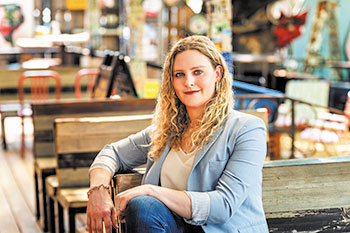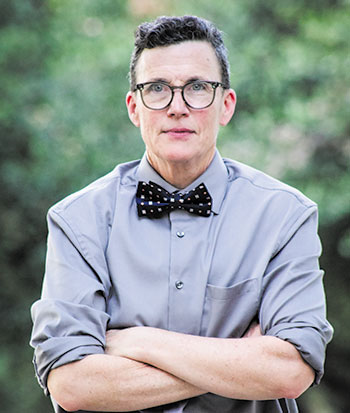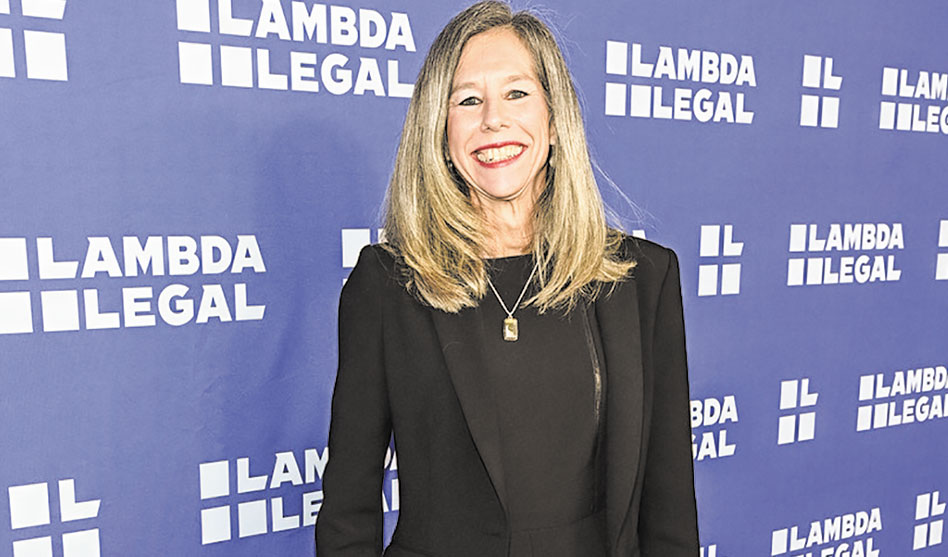Shelly Skeen
The Landmark Dinner marks a half century of fighting for LGBTQ equality
DAVID TAFFET | Senior Staff Writer
taffet@dallasvoice.com
Lambda Legal celebrates its 50th anniversary of fighting for LGBTQ equality with the Landmark Dinner at the JW Marriott Arts District Hotel on Saturday, Aug. 19. “Our story begins with a band of volunteer lawyers who believed they could break new ground for LGBTQ+ people through the American justice system,” Lambda Legal explains on its website. “They had $25 in the bank and a new name — Lambda Legal — that co-founder Bill Thom taped to his apartment mailbox using a Band-aid.”
Dallas-based Southwest Regional Director Shelly Skeen explained this week that the organization became its own first client. When judges in New York blocked the organization from filing as a nonprofit corporation, it represented itself in its first case. Finding Lambda Legal was “neither benevolent nor charitable,” the founders appealed the lower court’s ruling and won before beginning to represent other members of the LGBTQ community.
Lambda Legal handles impact litigation. That is, it takes cases whose outcomes have broad implications, such as the Obergefell marriage equality case.
But that doesn’t mean it’s not interested in personal cases. According to Skeen, Lambda Legal’s help desk receives about 7,500 calls a year to answer questions and suggest referrals.
The organization has been working in what seems to be overdrive this year, Skeen said, and is hiring staff and attorneys to expand its footprint in the region.
“Texas is a testing ground for bad legislation,” Skeen explained. “We’re filing lawsuits right and left to stop all this bad legislation.”
Challenging healthcare bans, Lambda Legal has filed lawsuits in Montana, Idaho, Missouri, Tennessee and Oklahoma in addition to three suits in Texas.

Callie Butcher
Lambda Legal is best known for what it’s gained for the community in terms of equality and rights for people with HIV.
For example, in a 1983 case, Lambda Legal sued to keep an HIV clinic from being evicted by neighbors who thought the clinic would lower property values. Lambda Legal won that case, and the organization has been winning HIV cases ever since, most notably in the military. Because of Lambda’s recent work, a client, who is HIV-positive but has undetectable virus levels, was able to be commissioned as a military officer just this month.
In another case, over whether people who are HIV-positive and undetectable can enlist, is pending. “And we just sued Nashville, which rescinded a job offer to a police officer when they found out he was HIV-positive,” Skeen said.
In the area of LGBTQ equality, the earliest win happened in 1974 in Gay Students Organization v. Bonner. The governor of New Hampshire threatened to defund the entire University of New Hampshire if the gay students’ association continued to hold events on campus. Lambda Legal sued and won, and the gay students group secured the right to be treated like any other campus organization.
Although Lambda Legal lost Bowers v. Hardwick in 1986, a case involving a man arrested at home for engaging in sexual activity that violated Georgia’s sodomy law, the organization helped develop a successful strategy to dismantle sodomy laws across the county, resulting in the 2003 Lawrence v. Texas case that found the few sodomy laws remaining in the country unconstitutional.
That case paved the way for the Windsor case, which declared the so-called Defense of Marriage Act unconstitutional, and Obergefell, which secured marriage equality in 50 states.
Arguably, the biggest threat to the community today are laws that criminalize doctors and parents who provide medically-indicated treatment to their transgender children. And Florida’s “Don’t Say Gay” law is being duplicated in other states.
States that once allowed birth certificates to be updated have passed laws to stop that; Lambda Legal filed a lawsuit in Oklahoma to stop such a law. And the organization has filed a second lawsuit against the state for its newly-enacted bathroom ban. And Oklahoma’s healthcare ban won’t go into effect until it gets a court hearing.

Morgan Davis
“Lambda Legal is in the fray to stop discriminatory conduct and bad new laws from going into effect,” Skeen said. “We’re challenging anti-LGBTQ legislation, and we’re winning.”
And, she said, for the most part, the outcomes have been successful.
Landmark Dinner
Skeen said the Landmark Dinner is just the beginning of its year-long 50th anniversary celebration. The evening begins with cocktails at 6 p.m. followed by dinner at 7 p.m. Callie Butcher, a trans lawyer and president of the Dallas LGBT Bar Association, will speak about this also being the 20th anniversary of Lambda Legal’s southwest office in Dallas.
Butcher is running for Colin Allred’s seat in Congress as is another Landmark Dinner speaker, state Rep. Julie Johnson who will speak on stopping bad legislation in Austin and introducing positive legislation.
Morgan Davis is a transgender CPS investigator who resigned rather than intimidate parents of trans kids who are providing their children with recommended health care. Amber and Adam Briggle, two of those parents, will also speak.
Dallas attorney Lauren Mutti, who practices employment law, will speak about how current legislation affects employers and LGBTQ employees, and Lambda Legal’s CEO will also briefly address the crowd.
Skeen said despite serious topics, the evening will also offer some humor, with Sister Helen Holy and Drag Queen Story Time by Xa’Pariis.
She said to look for an event in October to mark 50 years of Lambda Legal’s advocacy for the LGBTQ and HIV communities. And a year from September, she promised a museum exhibit on the history of the organization’s work.

